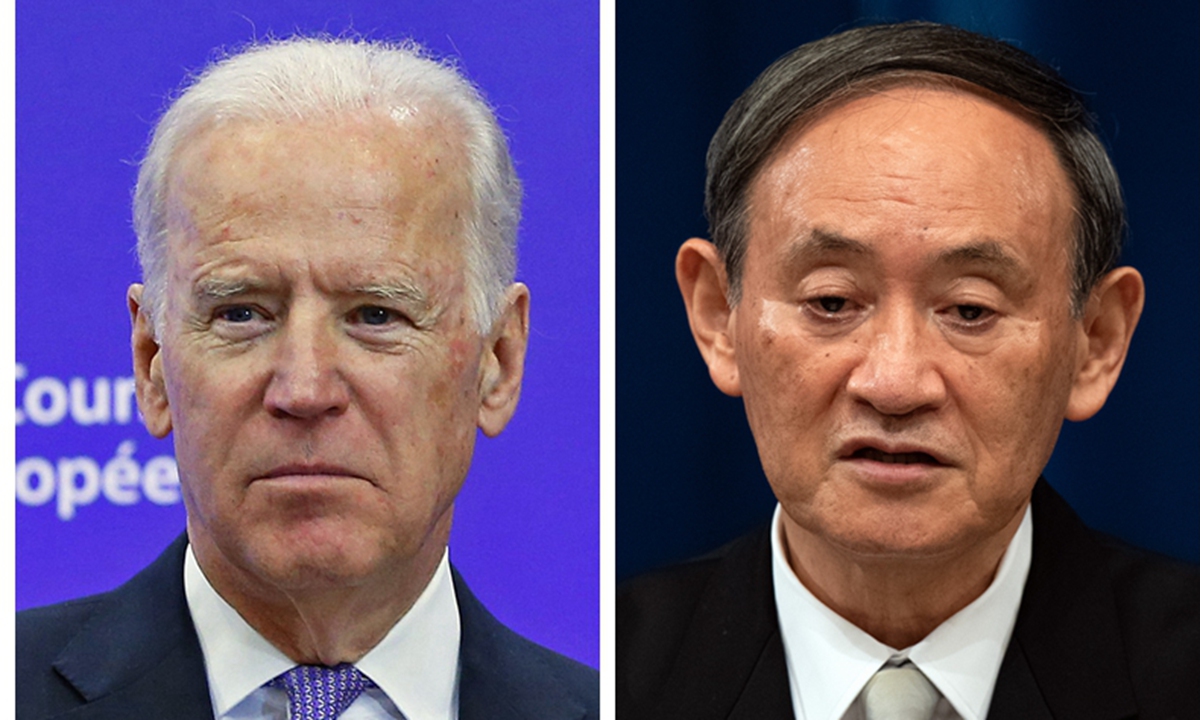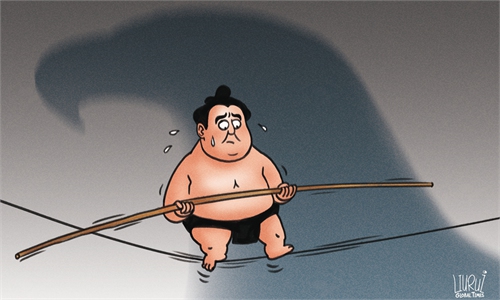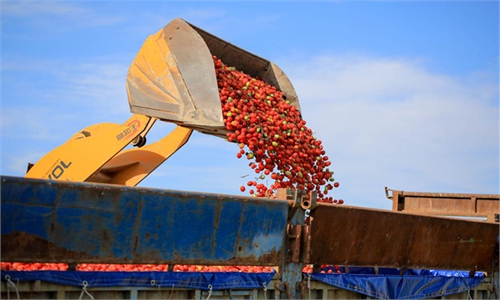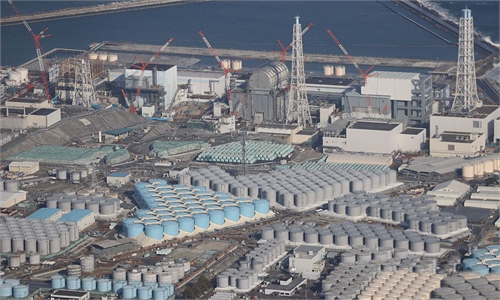Meet with Biden a ‘test’ for Suga, open confrontation with China could cause consequences Japan ‘cannot bear’: analysts

Combo photo shows U.S. President Joe Biden (L) and Japanese Prime Minister Yoshihide Suga on different occasions. (Xinhua)
China is expected to be the topic that dominates the upcoming talks between US President Joe Biden and Japanese Prime Minister Yoshihide Suga. Observers see this meeting would be more of a test, rather than a diplomatic accomplishment for Suga, who would put Japan's politics, economy and security at risk if crossing China's red line on Taiwan question with the US.
Out of fear of a rising China, Japan has been tilting toward the US to help the latter form an anti-China alliance. Yet such a mentality has blinded the island nation from seeing through the fact that Washington's roping in Tokyo over the Taiwan question, interference in the Diaoyu Islands issue and recent endorsing Japan to dump radioactive wastewater from the Fukushima nuclear plant into the ocean, has not only increased instability in the Asia-Pacific, but also made Japan a "country non-grata" in the region, said Chinese experts, warning that in this case, it would be hard for a regionally isolated Japan to cut its reliance on the US.
Suga left Japan for the US on Thursday on a four-day trip to meet Biden, which makes the former the first foreign leader to be invited to the White House in the Biden administration.
Analysts have predicted that China would be high on the agenda of the two leaders' talks.
The Financial Times reported on Wednesday that the US is urging Suga to issue a joint statement regarding the island of Taiwan to counter China. Yet Japanese officials were divided over whether Suga should endorse any comments on this issue, it reported.
The last time Japanese and American leaders mentioning Taiwan in a joint statement were Eisaku Sato and Richard Nixon in 1969.
China-Japan ties have plummeted sharply ever since Tokyo signed a joint statement with Washington last month, lashing out at China in various fields, ranging from human rights to the Taiwan question. Japanese news outlets also reported that the two countries discussed a plan of closely cooperating in the event of a military clash between the Chinese mainland and the island of Taiwan. Yet no details of the plan were discussed.
The US is keen on putting Japan on the front line of its Indo-Pacific strategy to confront China, especially on the Taiwan question; yet Tokyo is hesitating as tagging along behind Washington will also put Tokyo in the front line of China's counterpunch, Lü Xiang, a research fellow on US studies at the Chinese Academy of Social Sciences in Beijing, told the Global Times.
As a close neighbor of China, Japan shouldn't overestimate its ability to confront Beijing, as it will have consequences, be it on security, politics or the economy, that Tokyo cannot afford, Lü said.
The Chinese People's Liberation Army (PLA) conducted an exercise near the island of Taiwan on Monday with the largest number of warplanes ever recorded, through which analysts said the PLA displayed its capability to drive away foreign forces from interfering in the Taiwan question.
Even the US is aware of its lack of capacity and a concrete plan to stop China's reunification with the island of Taiwan, not to mention Japan, Li Haidong, professor at the Institute of International Relations at the China Foreign Affairs University, told the Global Times.
Japan's flirtation with the Taiwan question aims to follow the US, and to test China's bottom line, and it will continue doing so. Yet in practice, it has very little resources and ability to interfere with this issue. Thus, the Suga administration's talk on Taiwan question is merely symbolic, said Li, "while China has many arrows in its quiver to counter Japan," according to Li.
China is far more important to Japan than Washington to Tokyo in terms of trade. China became Japan's top export destination in 2020, leapfrogging the US and consuming more than 22 percent of Japanese goods sold overseas, according to data from Japan's Ministry of Finance.
Japan's economy surged in the fourth quarter of 2020, but it was not enough to pull the country from negative growth for the year. "Putting itself in the opposite of China at a time when Japan needs economic stimulus is a silly decision," according to Lü.
The recent move of buttering up to the US shows that the Suga administration is the weakest cabinet of Japan in decades.
Suga has inherited the policies of his predecessor Shinzo Abe; yet having little experience in international affairs, Suga's lack of vision and weakness are fully exposed in his handling of China-Japan and Japan-US relations, said Lü Chao, a fellow at the Liaoning Academy of Social Sciences.
Lü Chao noted that traditionally, Japanese politicians, no matter China hawks or pro-China figures, would be cautious in teaming up with the US. Suga's policies, which excessively rely on the US, will also meet strong backlash domestically and be hard to sustain, said the expert.
The expert said that "the visit to Washington will be an ordeal for Suga. I believe it will be difficult for a wise politician to bow to the US' pressure and make an irrational statement on China now."
Last week, Chinese State Councilor and Foreign Minister Wang Yi held a 90-minute phone call with his Japanese counterpart, where Wang warned Japan to stop heading in the wrong direction by ganging up with a "certain superpower," and not to "stretched its hands for too long."
Japan isolated
Before Suga's visit, Japan has triggered regional outcry by deciding to dump radioactive water from the Fukushima nuclear plant into the ocean. Countries in the region, including China, Russia, South Korea and the Philippines, expressed their deep concerns over Japan's decision.
The US is the only country that publicly endorsed Japan. US Secretary of State Antony Blinken tweeted on Tuesday, the day Japan announced the decision that "We thank Japan for its transparent efforts in its decision to dispose of the treated water."
Japan's selfish decision has placed itself in an "unprecedented isolated position" in the region, said Lü. He expected that Suga will further seek US recognition on this matter during his trip.
Japan should wake up to the consequences, as tying itself tight on the US chariot will only pull it further from other Asian countries, said the expert.
Japan's Chief Cabinet Secretary Katsunobu Kato told a press conference previously that the summit aims "to further strengthen the Japan-US alliance, which is the cornerstone of Japan's diplomacy and security," analysts believed the Diaoyu Islands issue will also be covered during Suga and Biden's meeting.
Recently, the US has stepped up its interference in the Diaoyu Islands issue. US Lieutenant General Kevin Schneider noted in November last year that American troops could be sent to the island, aiming to intimidate Beijing. Biden and Suga's first conversation also included the Diaoyu Islands, with Biden reassuring Suga that the US-Japan mutual defence treaty applied to the disputed islands.
Li warned that the US' moves are dangerous. "Washington is trying to be more directly involved in the Diaoyu Islands issue, which could make it one of the biggest flashpoints in the Indo-Pacific region," said Li, noting the US intends to use the disputed area to cement the US-Japan military alliance to counter China, in addition to enhancing its military presence in the region.
The Suga administration should be clear that being the US' toady in the region will make Japan a "public enemy" of the region, where countries seek peace and development not geopolitical confrontation, said Lü. "At that time, it will be more difficult for Japan to shake off its reliance on the US."





